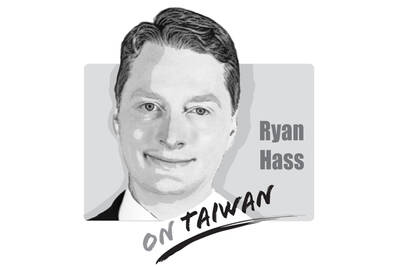I know several people from abroad who have a special affinity with Taiwan. They differ from the early missionaries — who were either sent here or came of their own accord because of a religious vocation, eventually developed a love for the place and, in many cases, made a significant contribution to the country — mainly in that they choose to return to Taiwan every year simply because they love being here, although unable to settle in the country because of their jobs.
The first person is a Canadian, who we shall call Brad, although that is not his real name. He came to Taiwan and loved it so much that he decided to do his doctoral research here.
When I introduce Brad to friends, I often tell them that he is more Taiwanese than many Taiwanese I know. Not only is he fluent in Mandarin, but he also knows some Hoklo — Taiwanese — and is even conversant in the Truku Aboriginal language. His partner is Taiwanese, born and bred. Brad likes southern Taiwan for the people and the weather, and the food there.
The second person is also Canadian. We shall call him Jean. Jean went to teach at a university in South Korea after getting his doctorate in Canada and first came to Taiwan to conduct interviews here for his academic work.
He was immediately taken by the rich diversity of Aboriginal cultures here. He decided to help Aboriginal groups become more economically self-sufficient and ecological sustainable. Although he subsequently moved to New Zealand, and then back to Canada, he is still in contact with friends in Taiwanese academic circles and applies for joint research projects with them so that he can return to Taiwan every year and conduct research.
In the fall of last year, I traveled to France to attend a meeting at the University of Lyon, where I met another fan of Taiwan, Michel — again, not his real name — who was working and teaching in the movie industry.
Michel told me that despite the countless destinations to visit in the world, he would continue to visit Taiwan every year, as long as his savings allowed. He told me that he prefers Taipei because there is always something happening, and also because it is so convenient and safe.
All of these friends have fallen in love with different aspects of Taiwan, but they are all drawn by the country’s rich, diverse culture and warm, giving people. This diversity is the result of hundreds of years, even thousands of years, of social change — with its various waves of immigration and colonial periods — and freedom from centralized political control.
However, now “Area Director” President Ma Ying-jeou (馬英九), apparently oblivious to this diversity and unable to grasp its value, is doing all he can to cozy up to China, with its centralized political system.
If we do not stand up and make our feelings known, all of this valuable cultural capital is going to be buried underneath China’s economics and culture.
Chi Chun-chieh is a professor in the department of ethnic relations and cultures at National Dong Hwa University.
Translated by Paul Cooper

There has been much catastrophizing in Taiwan recently about America becoming more unreliable as a bulwark against Chinese pressure. Some of this has been sparked by debates in Washington about whether the United States should defend Taiwan in event of conflict. There also were understandable anxieties about whether President Trump would sacrifice Taiwan’s interests for a trade deal when he sat down with President Xi (習近平) in late October. On top of that, Taiwan’s opposition political leaders have sought to score political points by attacking the Lai (賴清德) administration for mishandling relations with the United States. Part of this budding anxiety
The diplomatic dispute between China and Japan over Japanese Prime Minister Sanae Takaichi’s comments in the Japanese Diet continues to escalate. In a letter to UN Secretary-General Antonio Guterres, China’s UN Ambassador Fu Cong (傅聰) wrote that, “if Japan dares to attempt an armed intervention in the cross-Strait situation, it would be an act of aggression.” There was no indication that Fu was aware of the irony implicit in the complaint. Until this point, Beijing had limited its remonstrations to diplomatic summonses and weaponization of economic levers, such as banning Japanese seafood imports, discouraging Chinese from traveling to Japan or issuing
The diplomatic spat between China and Japan over comments Japanese Prime Minister Sanae Takaichi made on Nov. 7 continues to worsen. Beijing is angry about Takaichi’s remarks that military force used against Taiwan by the Chinese People’s Liberation Army (PLA) could constitute a “survival-threatening situation” necessitating the involvement of the Japanese Self-Defense Forces. Rather than trying to reduce tensions, Beijing is looking to leverage the situation to its advantage in action and rhetoric. On Saturday last week, four armed China Coast Guard vessels sailed around the Japanese-controlled Diaoyutai Islands (釣魚台), known to Japan as the Senkakus. On Friday, in what
On Nov. 8, newly elected Chinese Nationalist Party (KMT) Chairwoman Cheng Li-wun (鄭麗文) and Vice Chairman Chi Lin-len (季麟連) attended a memorial for White Terror era victims, during which convicted Chinese Communist Party (CCP) spies such as Wu Shi (吳石) were also honored. Cheng’s participation in the ceremony, which she said was part of her efforts to promote cross-strait reconciliation, has trapped herself and her party into the KMT’s dark past, and risks putting the party back on its old disastrous road. Wu, a lieutenant general who was the Ministry of National Defense’s deputy chief of the general staff, was recruited